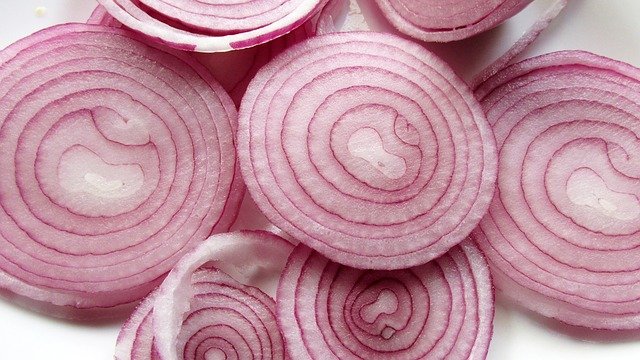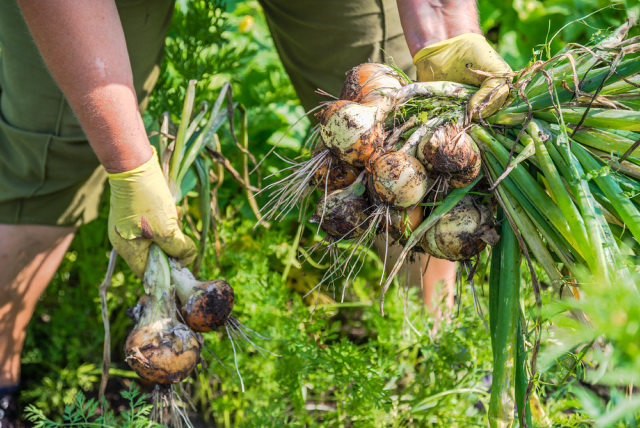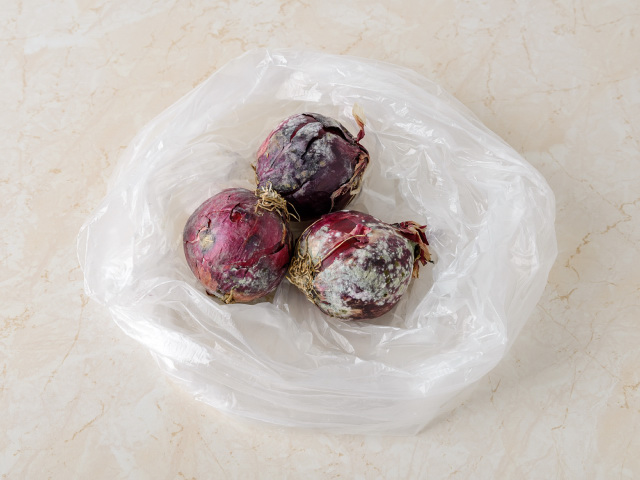Many varieties of onions exist, and it’s one of the most versatile and flavorful vegetables. You’ll find it used in all different types of international cuisine, adding a unique and complex flavor profile.
You often expect your onion to taste strong or sweet, depending on the variety you use. However, most people don’t generally associate onions with a bitter taste.
So when you’ve chopped up a fresh onion for a recipe and find that it tastes bitter shortly afterward, it can be off-putting, and you may wonder if something’s wrong with it.
Here, I’ll talk about why an onion can taste bitter and what you can do to prevent this from happening.

Table of Contents
- Why Is My Onion Bitter? — The Short Answer
- Can You Eat Bitter Onion?
- How Do Sulfur Compounds Cause a Bitter Taste In Onions?
- How Can I Prevent Cut Raw Onions from Turning Bitter?
- How Can I Remove the Bitter Taste From Onions?
- How Time of Harvest Can Cause a More Bitter Taste
- Are Some Varieties of Onion More Bitter Than Others?
- How Can I Tell If an Onion Has Gone Bad?
- Some of My Favorite Kitchen Items:
Why Is My Onion Bitter? — The Short Answer
Raw onions can develop a bitter taste because of the sulfur compounds in them that are released when you cut them. However, onions can also develop a foul taste if they start to go bad or develop mold or if you’ve overcooked them or cooked them over too high heat. Onions can also taste slightly bitter if you harvest them too late in the season.
Can You Eat Bitter Onion?
Yes, you can eat an onion that has turned bitter without any health effects, as long as the bitterness isn’t from the onion rotting or going bad. However, the bitter taste of the onion might not be palatable if eating it raw. Or, if adding it to a recipe, it can negatively affect the overall flavor profile of your dish.
If the bitter taste of the onion has to do with the onion rotting or developing mold, you want to discard it immediately and not consume any part of it. Eating an onion that has gone bad could make you sick.
How Do Sulfur Compounds Cause a Bitter Taste In Onions?
Onions, along with garlic and leeks, contain a significant amount of sulfur in them. Sulfur is an essential compound for the body’s health, and it’s also what is responsible for making your eyes water when you cut into them. Interestingly, red onions have almost double the amount of sulfur as brown or yellow onions, which could explain why many people find cutting them less tolerable.
However, for years, scientists were baffled by the fact that raw onions seemed to turn bitter when people chopped them for use in cooking. Despite speculating that it had to do with the sulfur composition of the onion, they couldn’t quite pinpoint it to the same sulfur compounds that make your eyes tear up.
Then, Czech scientists stepped in and researched the issue more thoroughly. They found that the onion spontaneously forms new groups of sulfur compounds (called allithiolanes) when it gets damaged (such as by cutting it up). It’s these new compounds that contribute to the bitter taste.
In fact, their research indicated that it only takes about 30 minutes after damaging the onion for it to start to develop a bitter taste that was quite strong. So, what does this mean for the everyday home cook trying to prep a meal for their family?
The main takeaway that home chefs can apply in their kitchens is that you should not cut onions too far in advance from when you want to consume them or add them to your recipe. If you cut a raw onion and let it sit out on the counter for an extended period will, in fact, cause it to turn bitter.
How Can I Prevent Cut Raw Onions from Turning Bitter?

Unfortunately, if you’re like me, you like to prep as much as possible for a meal in advance, knowing that chopping, slicing, and dicing take up quite a bit of time. However, now that I’ve learned about onions, I’m hesitant to cut them up ahead of time when I need them.
Ideally, the solution to preventing onions from turning bitter is to chop them up immediately before you will consume them or add them to your recipe. However, sometimes you just cannot avoid prepping this vegetable in advance. So, what do you do?
One way to remedy the bitterness of an onion is to soak it in ice-cold water after chopping it and then thoroughly drain it right before you use it.
I’ve tried this method myself and find it works when I need to cut up onions more than 30 minutes before using them. I simply place the chopped onion in cold water and drain it before adding it to my recipe.
How Can I Remove the Bitter Taste From Onions?
If you find that you have a batch of onions that’s turned bitter, you can also take a few other steps to ensure that they won’t negatively affect the taste of your recipe.
Sprinkling the onions with an acid, like vinegar, will help to counteract the bitterness and help them lose the strong taste and turn slightly sweeter. This method is suitable if you want to eat raw onions and remove the bitter taste.
If you’re adding onions to a recipe, you may want to try using a bit of salt with some water. Dissolve a tablespoon of salt in a full glass of water, and then pour it over the chopped onion. Let it sit for 10 to 15 minutes, drain it, and rinse it with cold water. You should find that the onion no longer tastes bitter.
You can also try pouring some boiling water over the onions, letting them sit for a few minutes, and then rinse them with cold water.
If you’re using the onions in a dish that contains acid or salt, like a soup, you likely do not have to do any additional prep to the onions before adding them to the recipe. The other ingredients and spices in the soup will counteract and balance the bitter flavor. Therefore, prepping the onions in advance shouldn’t cause you any trouble.
How Time of Harvest Can Cause a More Bitter Taste

If you grow onions, you will find that the earlier you harvest them, the milder taste they will have. You’ll know that your onions have finished growing when the leaves (starting with the lower ones) start to turn yellow.
Onions harvested later in the summer will have a more pungent taste, and if left in the ground too long, it can even cause them to develop a slightly bitter taste. However, this taste should differ slightly from the one caused by chopping and leaving raw onions on the counter.
Are Some Varieties of Onion More Bitter Than Others?
Since there are wide varieties of onions, some tend to be more pungent than others. Some people may interpret this strong flavor with bitterness and find onions challenging to eat.
For example, red and yellow onions are more intense than sweet or white ones, and shallots also tend to have a powerful taste. The stronger the taste of the onion, the more sulfur it contains.
Therefore, you can expect a more pungent onion variety to develop a more intense bitter taste when cut and left out than a milder, sweeter variety with fewer sulfur compounds.
If you find that your red onions always turn bitter tasting when cut, you may want to try a Vidalia onion or white onion variety instead.
How Can I Tell If an Onion Has Gone Bad?

Finally, it goes without saying that an onion starting to go bad or gone bad will not have the most pleasant taste. Eating a rotting onion could also make your feel sick.
Because onions, when stored properly (I love this onion storage bag), can have a very long shelf life (up to 3 months), you must recognize the signs that your onion is past its prime so you’ll know when to toss it in the compost bin or trash.
If your onion has already turned rotten, you likely will notice right away and won’t try to eat it. It will have a squishy texture and may have an incredibly foul smell. If your onion does not feel firm or smells putrid, it’s not suitable for consumption.
However, if an onion is just starting to go bad, you may not always notice the less obvious signs. Sometimes a small spot on the onion will have turned brown or softened a bit. If you can cut off this spot and the rest of the onion looks and feels ok, you should be able to consume it without issue.
You can also consume an onion that’s started to sprout but has no other signs of mold or rotten spots. Remove the sprouts, check the onion for any other signs of spoilage, and if all looks ok, you can use it safely.
Like all other vegetables and fruits, safe is always better than sorry. If you have questions about whether or not your onion has spoiled, it’s best to throw it away.
When I harvest more onions than I’ll be able to use in a reasonable amount of time, I peel, chop, and store them in the freezer.
Although freezing onions causes them to lose their firm texture a bit, these onions still work well for recipes like stews, soups, or casseroles. A bonus is that they’re already chopped, so I don’t have to worry about them turning bitter on the counter as I prep the rest of the recipe.
Some of My Favorite Kitchen Items:
Related Reading:
- 8 Reasons Onions Are Small (With Solutions)
- Growth Stages of an Onion: From Seed to Harvest
- Why Is My Garlic Bitter? Answered!
- Eating Turnip Greens With Recipe Ideas
- Why Is My Rutabaga Bitter? Here’s What You Need To Know
- Why Is My Daikon Bitter? Answered!
- Quick Pickled Radishes Recipe
- Why Is My Cabbage Bitter? Answered!
